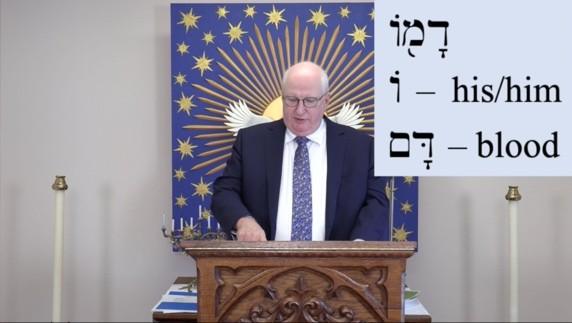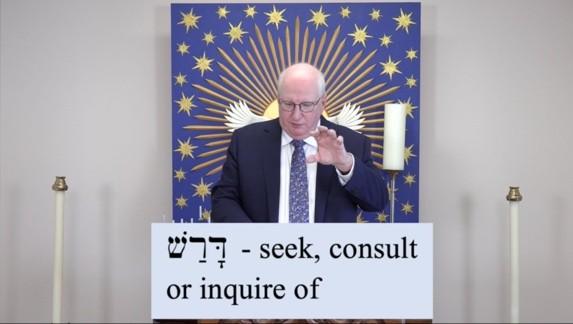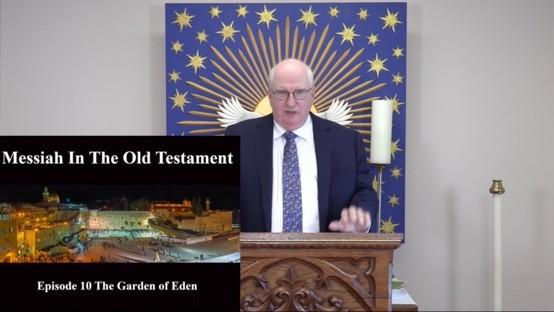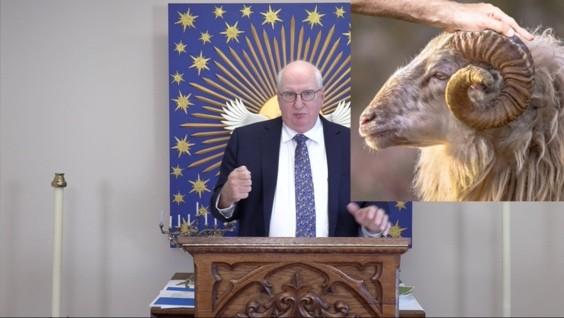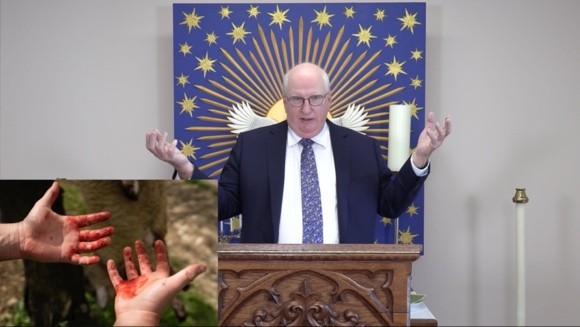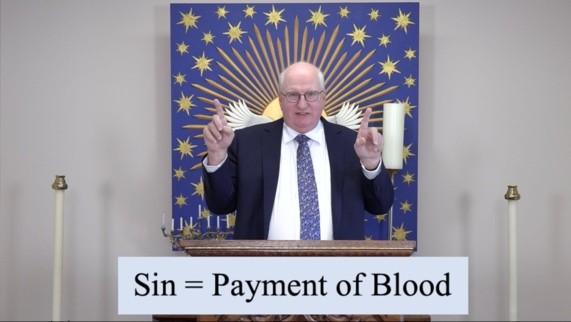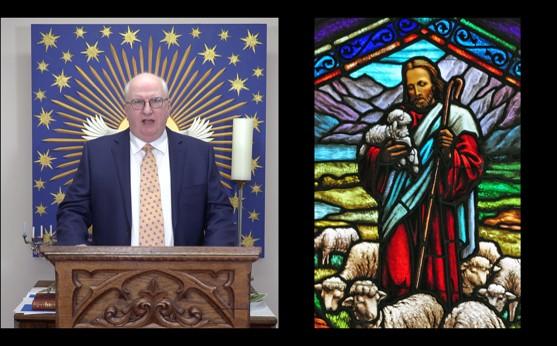Messiah In The Old Testament Episode 32
The Life is in the Blood

Welcome to Messiah In The Old Testament. In our last two episodes we told you the Biblical Flood Story. And as we told that story we revealed to you seven new Messianic Prophecies.

Now, we got really really excited about that because more and more Messianic Prophecies are coming out. We’re up to 31. And in the old days, I would just put the whole list of them up so you could see all of the prophecies so far. The list has now grown so large that’s not even possible. So, what we have done is taken all those prophecies and now we have put them on our website.


If you go to the homepage at findingmessiah.org, look at the top. You will see a link that says “List of Prophecies.” Click on that and then you'll be able to scroll down and look at all the prophecies from the very first one we presented up till the current one. Now, we post new prophecies every time we put up a new video. We add our prophecies that have been revealed to the list, as well as our transcripts. Now, at the beginning of this episode, we find ourselves outside the ark. We find ourselves standing some ways away from the ark. It is empty.

Noah is there sacrificing, taking his clean animals and sacrificing them to God. And that is where we ended our last episode. It’s been now over a year since the flood began, on that fateful day on the 600th year 2nd month 17th day of Noah's life.


Elohim sealed up the ark, shut the door, closed it tightly and put a seal of protection around them. And then shortly after that, on the very same day, the fountains of the deep broke open. And all the water began spewing out and creating a flood And then the floodgates of heaven, those lattices, windows, apertures suddenly were thrown open. And then a deluge of water started pouring out of the sky. And we learned that there were 40 days and 40 nights of this torrential rain that was coming [down]. And we theorized that there would be a giant thunderstorm or giant hurricane and spinoff tornadoes and waterspouts. It would have been a worldwide destructive storm. But everybody was kept safe inside the Ark. This kept going for 40 days and 40 nights. The waters kept increasing and multiplying and pouring in. And the Ark just floated right on top.


Now at the peak of our flood, we learned that the Ark, on the top of the water was 20 feet above any of the mountain peaks. The water had gained 20 feet over the highest point of land. And remember, we did that exercise where we took the earth, we flattened down all the mountain and made the surface flat, filled in all the oceans. Then we took that flat surface and took all the oceans out of the water, spread it out on the surface of the earth and calculated how deep the water would be.

And we came up with a number of 1.6 miles deep. So that's how much water is in our oceans. It could cover our earth by 1.6 miles. The flood kept coming and coming, reached its peak, and then finally it began to subside. And Genesis tells us that Elohim took a ruach. He took a wind. He took a spirit.

And that ruach went all over the earth. And as it went throughout the earth, it was pushing all the waters back in. And all the waters began receding where this wind blew. And this was a scene very reminiscent of the creation story. Remember that Ruach Elohim was fluttering, hovering over the waters, brooding over the waters. Remember the word merachefet. And that is a very similar picture to what we’re seeing now with the flood. So, the waters are going down, going down, going down and then finally mountain peaks are starting to reappear.

And then the ark runs aground on the series of mountains called Ararat. The waters continue to recede. The earth dries out. But then it takes longer for the actual ground to dry out. And then, all this time, the vegetation is starting to grow. And the world is becoming green and lush again. And then Noah sends out the birds in series. And then finally realizes that the earth is dry. There are plants out there to sustain all the animals.

And so, he opens up the ark. So then, he escorts the animals off the ark. The animals go out into the world, this newly vegetated, newly recreated, I should say, world, ready for them to procreate and replenish the earth. Now Noah was sacrificing and remember, in our last episode that sacrifice went up as a sweet aroma before Elohim.

Elohim smelled it and he was pleased. And he switched then from judgment mode: all this chaos, destruction, floods and the thunderstorms and hurricanes. He switched from all that now to blessing mode. And he's here with Noah. They’re having a conversation and the blessings are flowing. Now, before I tell you the blessing that he's ready to bestow upon Noah and Noah's three sons and their wives and all the animals as well. Let's go back and look at the blessing that we read about, and that was back in Genesis 1:28&29.


This was the blessing that Elohim gave over Adam and Eve. And remember, they’re still in the Garden and they hadn’t sinned yet. This was their blessing of how to move forward in the Garden.
God blessed them and said to them, “Be fruitful and increase in number; fill the earth and subdue it.
Now, the words that are used in the Hebrew.

The word that's translated as be fruitful, that is the word … wrVÚp (peroo). The ending, …w the shurook ending is just
the masculine plural ending. He's talking to Adam and Eve - plural. And then later he’s talking to Noah and his sons and their wives – plural. So, that's why you get the oo ending at the end. So, …wrVÚp (peroo) comes from the root h∂rDÚp (parah). And that is the word for fruit. And used in this context it's fruitful.

It means, the picture of a fruit tree, branches hanging low to the ground. So, like, I live in apple country. We have apple orchards and the harvest is just so, so plentiful some years that the branches are actually touching the ground because the apples are just so heavy. They are pulling the branches down. That is the the picture we have here. So, Elohim told Adam and we are going to see it here telling Noah, “I want you to be fruitful. I want you to be abundant. I want your branches touching the ground. I want you to be so full of fruit that you are just reproducing like crazy.

The second word, the word increase that's the word in the Hebrew … wb√r (raboo). Again the shurook ending …w for the masculine plural. It comes from the root hD;bår (rabah). We know this root.
This is the root for increase, for multiply. And so, this means that that Adam and Eve were supposed to increase in number, increase in volume, increase in influence, increase in everything.



And then the next word, the word fill. That is from the Hebrew wñaVlIm (miloo) and that is from the root aElDm (malay) and that means to fill up. It's the picture of I have a sand pail. And I'm taking my sand pail and I'm filling is so full of sand and when we carry the sand to make our sand castle it is falling off the side. Or, I’m filling it up with water and the water is sloshing over the sides. That is the filling that Adam and Eve were supposed to do. They were supposed to fill up the earth so that it was full to overflowing.


And then the fourth word, subdue. That's an interesting word. In this verse, it's UvVbIk (kivshoo) but the root is vAbD;k (kavash) and that word has made its way into our language. We use the word kibosh, in the context of I’m going to put the kibosh on that. It comes from the Yiddish, of course. Kibosh means to subdue, to bring under control. It's like when you are wrestling the alligator in the Everglades, trying to bring that alligator under control. And you’ve got two or three guys on the alligator trying to subdue it. And finally, you subdue it and throw the duct tape around his jaws so he can’t bite you. That is the picture here, of subduing, kibosh. They were supposed to subdue the entire earth. So, in the context of the Garden of Eden they were to subdue the Garden. And I think even go beyond that and subdue the entire earth.
Rule over the fish of the sea and the birds of the air and over every living creature that moves on the ground.” Then God said, “I give you every seed-bearing plant on the face of the whole earth and every tree that has fruit with seed in it. They will be yours for food.
So, this blessing says that Adam and Eve were supposed to rule over. They were supposed to be the caretakers. They were the stewards. They were taking care of the animals. They were naming the animals. They were tending to the Garden. They were providing a healthy and safe environment for the animals. They weren’t eating them. They were protecting them. They were their stewards. Their food source was the fruit in the garden as we have talked about many times in previous episodes. Their food source was seed-bearing plants, like grains and vegetables, root vegetables. So, that is what Adam and Eve were supposed to eat. They were on a plant-based diet. Now let’s look at the blessing [of Noah]. Things are changing. The whole world is changing. And there are going to be quite dramatic changes revealed in this next verse.


So, this is Genesis 9:1-3
Then God blessed Noah and his sons,
So, they're all there together, their sons, the whole family, their wives and even I think most of the animals were still around at this point in time.
And he said to them, “Be fruitful (familiar - peroo) and increase (raboo) in number and fill the earth (miloo).
So, same blessing, they are supposed to be fruitful, increase, fill, a picture of overflowing abundance. You notice there's no subdue here. So, the thought that they were going to bring things under control and create a safe and protective environment. That was kind of out the window now.
The fear and dread of you will fall upon all the beasts of the earth and all the birds of the air, upon every creature that moves along the ground, and upon all the fish of the sea; they are given into your hands.
Its changed from being steward, champion, supervisor, protector of the animals. Now, the animals are running scared. Every time they see you there just boop…off in the woods. And this still happens today. If I go take a walk out in the woods near my house or out in the country near
my friend’s houses, as I'm walking through the hardwood forest I’m going to run across such creatures as Whitetail Deer. A Whitetail deer gets scent of you, he sees you moving, he's like bounding off in the other direction. Or a Fox, if a fox catches wind of you, sees you moving, he's racing off in the opposite direction. And even skunks and badgers and coyotes and name a creature, pretty much they’re scared of men. That instinct is still there. The fear of man is still there. Now, there are certain situations where animals will become domesticated and become more friendly. You can befriend a squirrel. I had a friend whose dog befriended a squirrel and they played every day together, having the greatest of time. So, even though that instinct of being skittish and running away [is there] it can be overcome with conditioning.
Everything that lives and moves will be food for you.
So, we’re not just limited now to the plants, the seed-bearing seed, the fruit, the trees with the fruit-bearing seed in it.
Just as I gave you the green plants,
So, that back to Adam and Eve’s blessing. So, I gave you all that plantbased stuff, but now:
I give you everything.
So, now there are no limits now on their diet. Noah, his sons and their wives they can eat any animal, anytime, under any situation. The limits are off. The animals are racing away from man. Man is going to come and hunt and eat them. And we will see throughout the rest of the Tanakh, stories that involve hunting, stories that involve catching wild game, eating wild game, etc. So now, that is the change. I’m going to put up a table real quick, so you can just visualize all that we just said.
Blessing Authority Food
Adam Fruitful, Increase, Fill and Subdue Rule Over Plants and fruit
Noah Fruitful, Increase and Fill
Animals Fear, Given into hands Plants, Fruit plus Animals
It's got a line for Adam and a line for Noah. And it's got their blessing. Adam blessing: fruitful, increase, fill and subdue, those words we just went over. Noah [blessing]: fruitful, increase, and fill. You will notice subdue is missing. The authority given to them: Adam and Eve were given the authority to rule over the animals as steward and protector. Noah, animals were now fearing him. They were all given into his hands. He could eat them anytime he wanted. And then, of course, the food source: plants and fruit for Adam and Eve, plant-based diet. And then plants, fruit plus animals so omnivorous diet after that. Now, our new food source, you know all these animals. Of course, they’re off into the four corners of the earth, procreating and populating. And there's this big huge explosion of population that is coming. That ability to eat them came with some dietary restrictions. And here it is. In Genesis 9:4.

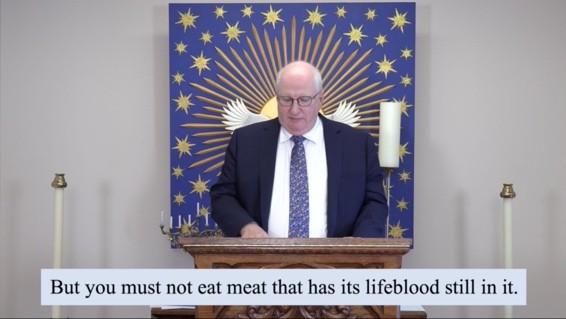
It says:
But you must not eat meat that has its lifeblood still in it.
Very important verse, and we’re going to tear this apart and look at it in detail. But this verse tells us why the Nephilim when they ate the wild animals [and] they ate the fish, the birds with their blood still in them, they ate them alive. That is why they defiled themselves when they did that. That is why the families were defiled. So, eating anything that is still alive is verboten. It is not allowed. It was not allowed then and is still not allowed today, certainly within the understanding of the dietary laws. So, let's look at a couple of verses out of the Mosaic laws regarding eating meat with blood in it. The first one is Leviticus 19:26.


That one says:
Do not eat any meat with the blood still in it. So, you had to drain the blood if you’re going to eat the meat.


Deuteronomy 12:23:
But be sure you do not eat the blood, because the blood is the life, and you must not eat the life with the meat.
So, very important to separate the blood and not eat the blood, just eat the meat. Now, let's talk about this verse in detail. What we’re talking about is this: the concept of lifeblood. That is what I want you to understand, what lifeblood is. So, this verse in the Hebrew. I’ll read it to you. It says:




